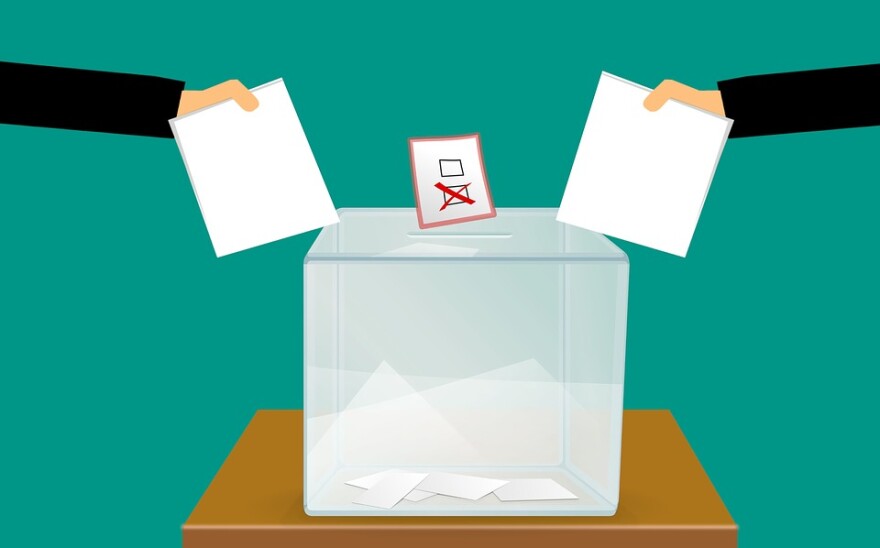Eleven Republican state lawmakers filed suit in federal court Thursday to invalidate two of Michigan’s recent constitutional amendments concerning elections.
One target is Prop 2018-3, which ushered in no-excuse absentee voting, and same-day and automatic voter registration. It also lent constitutional protections for straight-ticket voting. It passed with slightly over two-thirds of the vote.
The second target is last year’s Prop 2022-2. That amendment created a nine-day early voting period, guaranteed the right to vote without a photo ID by signing an affidavit, and required state-funded postage for absentee ballots. Voters approved it by a nearly two-to-one margin.
The lawsuit alleges both amendments, which got to the ballot via the petition process, unconstitutionally skipped legislative input. It argues both the U.S. Constitution and the Michigan Constitution give authority over election laws to state lawmakers.
“The petitioning and state ballot processes to amend the Michigan Constitution under Article XII, Section 2, when used to regulate the times, places, and manner of federal elections, are per se violations of legislators’ federal rights under the Elections Clause because the state legislators are not involved,” the lawsuit reads.
During a press conference announcing the lawsuit Thursday morning, the plaintiffs outlined their concerns with the amendments.
“The result we face now is a series of provisions that we believe have been improperly added to the Michigan Constitution. They purport to limit the ability of the Legislature to pass sensible election laws,” Senator Jonathan Lindsey (R-Allen) said.
The lawsuit quickly received opposition from voting rights groups that had supported the amendments.
Michael Davis Jr. is executive director for the group Promote the Vote, which sponsored both efforts. He said the efforts were ways for voters to “make their voting system more secure and accessible.”
“The power-hungry, anti-democratic forces behind this lawsuit seek to steal the power properly exercised by the voters of Michigan for themselves. There’s not a chance in hell that Promote The Vote, our coalition partners, the courts or the voters of Michigan are going to let that happen,” Davis Jr. said in a written statement.
Another group, Voters Not Politicians, which helped create the Michigan Independent Citizens Redistricting Commission in 2018, shared that sentiment. Programs Director Kim Murphy-Kovalick called the lawsuit baseless.
“Just to continue to have this conversation being led by conspiracy theorists and far right fringe groups that want to curtail access to the ballot is ridiculous from top to bottom,” Murphy-Kovalick said.
But, during Thursday morning’s press conference, supporters of the lawsuit claimed voters didn’t fully understand the ballot initiatives when they cast their votes. They defended their legal action against the strong margins the amendments originally passed with.
“We’re actually the ones going out there and saying when the process is used to subvert the will of the people, we’re going to stand up and fight for them,” Lindsey said.
Lindsey said it wasn’t a matter of an issue with the ballot initiative process, but how the questions got to the ballot to begin with. He said the Legislature should have been able to decide whether to put the questions before voters since they dealt with the election process.
Lead attorney Erick Kaardal, who has been involved in several lawsuits with government entities throughout his career, including a losing challenge of the 2020 presidential election results, called the Michigan suit a civil rights issue. He claimed circumventing the Legislature infringed on lawmakers’ civil rights.
“We think this is nationally super important. It’s a great civil rights case on steroids. It’s just fantastic,” Kaardal told reporters.
The crux of his case falls on an interpretation of Article I, Section 4, Clause 1 of the U.S. Constitution, commonly referred to as the Elections Clause.
“The Times, Places and Manner of holding Elections for Senators and Representatives, shall be prescribed in each State by the Legislature thereof; but the Congress may at any time by Law make or alter such Regulations, except as to the Places of chusing Senators,” the section reads.
Congress’ own explanation of the clause notes that in 2015, the U.S. Supreme Court took an expansive view of the word “Legislature” in that clause. The court ruled in the Arizona State Legislature v. Arizona Independent Redistricting Commission case that “Legislature” could refer to a body with lawmaking power, including the people of Arizona.
Non-commercial, fact based reporting is made possible by your financial support. Make your donation to WEMU today to keep your community NPR station thriving.
Like 89.1 WEMU on Facebook and follow us on Twitter
Contact WEMU News at 734.487.3363 or email us at studio@wemu.org






